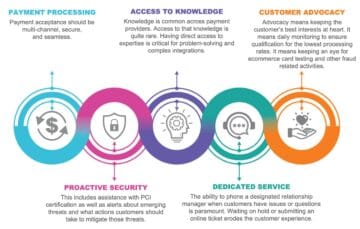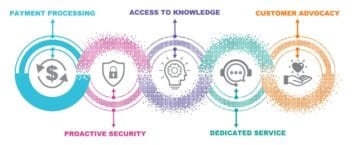Key Components Are Often Overlooked by Software Providers
Here’s a little-known fact – when it comes to frictionless payments, there are actually two distinct audiences with two distinct needs that software providers (ISVs) must support. The first audience, and most recognized, is Consumers (aka your customer’s customer). The second audience is your Software Customers. While this group does not get quite as much recognition in the frictionless payments world, their experience is equally important. Moreover, ISVs wishing to effectively compete in this modern era must accommodate both audiences with their integrated payment solution.
This article explores frictionless payments from both the consumer and the software customer perspectives and provides compelling reasons why ISVs need to pay close attention to both.
Consumer Frictionless Payment Experience
Most merchants and ISVs with integrated payments are familiar with this one. It is straightforward and simple. Remove as many barriers in the check-out process as possible. Just make it fast and effortless for consumers to pay, however they want, whether they are onsite, online, or on their cell. This includes seamlessly enabling methods such as:
- Contactless
- Mobile wallets
- In-app payments
- One-click payments
- Near Field Communications (NFC)
- Auto-renewing subscriptions /Recurring payments
Consumers like a frictionless payment experience as it is quick and easy – regardless of channel. Moreover, usage of emerging payment methods continues to grow, so you’ll need to grow right along with it. For example, contactless payments, which saw a huge spike in adoption during the pandemic, have shown minimal tapering-off in this post-pandemic era. Likewise, adoption of mobile wallets is showing no signs of decline with 40 percent of smart phone users over the age of 14 using a mobile wallet for digital transactions.
Merchants, i.e., your software customers, like frictionless payments because they expedite the check-out process onsite and reduce shopping cart abandonment online. In fact, friction in the check-out process is one of the top causes of abandoned shopping carts. Remove that friction by enabling easier, faster commerce, and your customers will be very happy with you.
Software Customer Payment Experience
It is common to focus singularly on enabling integrated payment by partnering with one or more payment processing providers. This all fine and dandy until you realize that, in reality, there are five dimensions of integrated payments for your customers, not just one. Each plays an essential role in the overall payment experience you deliver. Is it smooth, frictionless, or something in the middle? Emphasizing the simple act of payment processing over the other dimensions in the integrated payment process leads to a disjointed, friction-filled experience. And, as a result, a decline in your customer satisfaction.
Your customers’ payment experience comprises these dimensions:
- Payment processing
- Proactive security
- Access to knowledge
- Dedicated service
- Customer advocacy
PAYMENT PROCESSING
This is table stakes for ISVs with integrated payments. If your payment provider cannot enable omni-channel, frictionless payments in your platform, time to consider a new payment provider. Taking that a step further, your customers deserve transparency when it comes to processing rates and fees. Often, pricing is intentionally vague, and statements are difficult to decipher. Both will diminish the payment processing experience for your software customers.
PROACTIVE SECURITY
Cybercriminals are getting more creative and more active day by day. Thus, a critical part of your customers’ payment experience is receiving timely information on how to protect their business from the latest threats. For example, the federal Cybersecurity and Infrastructure Security Agency (CISA) recently recommended that organizations – large and small – implement its Shields Up program to defend against growing cyberattack threats from Eastern Europe. Proactive alerts like this will ensure your customers are taking recommended steps to improve cyber hygiene and protect themselves. But they can’t do that if they don’t know about it. There’s a lot at stake for your customers. This is why proactive security is so important to a frictionless payment program.
ACCESS TO KNOWLEDGE
Not every integration is cut and dried. Not every one of your customers is cookie cutter. Any payment provider worth its weight has the knowledge to solve problems and set up more complex integrations. Unfortunately, gaining access to that knowledge and getting them to help are entirely different matters.
Call it a byproduct of payment industry mergers or call it indifference on the part of some payment providers. The end result is the same – there is real friction interfering with access to the payment expertise you and your customers need.
Related Article: The Fallout of Payment Company Mergers
DEDICATED SERVICE
Ideally, your customers would never have a payment related concern or issue. But the reality is, stuff happens. What separates a positive customer experience from a negative one is not whether or not an issue arises. It is how quickly that issue gets communicated and resolved. As such, the importance of getting timely resolutions to problems – without the need to jump through hoops – cannot be overstated.
This does not mean filling out a ticket online then waiting days for a response. Nor does it mean waiting in long phone queues to talk to a randomly assigned customer service rep. It requires a dedicated account person – who is accessible and has the ability to answer questions and get problems solved.
CUSTOMER ADVOCACY
This is actually a unique component that is often missing in an integrated payments platform. Customer advocacy keeps your customers’ best interests front and center in the relationship with your payment provider. Let’s take interchange fees as an example.
There are literally hundreds of different interchange fees charged by the credit card companies (Visa, Mastercard, Discover, and American Express). While these fees are non-negotiable, there are factors that can help your customers qualify for a lower rate.
These include:
- Total payment volume
- Method of payment data capture
- Data elements that are passed in the transaction
Customer advocacy, in this case, means proactively looking for ways to help your customers qualify for those lower rates. Having your customers’ back is a big deal – and a huge part of their integrated payment experience.
Why a Frictionless Software Customer Experience is so Important
No doubt, delivering a frictionless software customer experience is a fresher, customer centric concept. But it is also one that is gaining momentum across software providers. ISVs that get on the front side of it, will stand out from their competition – on many different levels. Revenue growth. Customer retention. Market share.
Those that continue to focus solely on Payment Processing as a standalone feature risk a payment experience like the one below. Lots of static. No smooth path.
To meet the evolving needs of customers, it’s time for ISVs with integrated payments to take a step back and truly assess what kind of experience their payment program is delivering. Is it smooth or are you finding friction across the various payment touch points?
Objectively making that assessment can be a challenge. I always recommend that ISVs talk with some of their customers about their experience. Just a few simple questions can be illuminating:
- When was the last time you heard from your integrated payment provider?
- Are they helping you with PCI and other security related issues?
- How hard is it to get a problem solved or a question answered?
- Have they ever discussed ways to reduce your processing rates?
Here’s another resource you may find helpful. It’s authored by the founder of a software company and provides details on five things to look for in an integrated payment partner. It’s a quick read that will be well worth your time. You’ll never regret delivering a frictionless payment experience.





